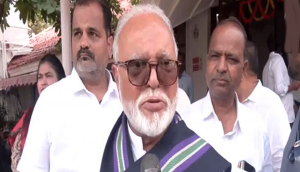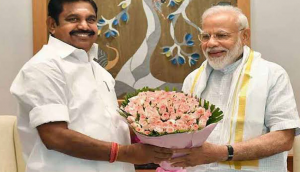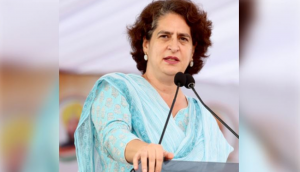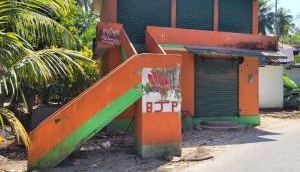Modi best hope for Kashmir resolution, Imran Khan only echos perception in valley

BJP’s ideological position on J&K seeks complete integration of the state into India, something that goes against the political aspirations of the majority of the people of the state. The Hindutva party seeks revocation of the Article 370 which gives special status to J&K under Indian constitution and Article 35A which bars outsiders from settling in the state. The BJP government also presides over the give-no-quarter militaristic policy towards Kashmir which has only worsened the security situation in the state.
But despite this the opinion that the PM Modi is the best hope for an acceptable Kashmir resolution between India and Pakistan has wide currency in the state.
So, Pakistan prime minister Imran Khan is not alone. The public perception in Kashmir echoes him too.
After Khan made his preference for Modi clear during his interaction with the journalists in Pakistan, former J&K Chief Minister Mehbooba Mufti was quick to cite it as also the reason for her party to ally with the BJP in the state in 2014.
“What Prime Minister of Pakistan is saying now has been said by my father Mufti Sayeed before,” she told party activists at a meeting soon after Khan made the statement. "My father also thought Modi was in a better position to solve Kashmir and hence we should form the government with the BJP in our state".
Ironically both these perceptions conflict with Modi's personal image and his party's political agenda on Pakistan and J&K. During his five years in power, the PM has chosen not to engage with Pakistan except on his terms and in regard to Kashmir, contrary to Mehbooba's hope, his objective has been the state's complete merger with India rather than an acceptable resolution.
But the perception that Modi is the man to resolve Kashmir still persists. Why? One reason certainly is the popular belief that the charismatic strong leaders can take hard decisions and still carry people along. It is also true about the ideological right represented in India by the BJP.
"This is the universal thing. Political right is seen capable of making difficult and contentious decisions and get away with it. For example, Modi sold to people demonitization, too" says Naseer Ahmad, a local columnist. "But the irony is that in Kashmir the perception lingers despite the fact that the BJP's priorities on the state have complicated rather than helped solve the issue".
More than perception
A popular preference for the BJP as the only hope for Kashmir resolution also springs from the credible movement on Kashmir front during the previous BJP government under Atal Bihari Vajpayee. It was Vajpayee who in February 1999 undertook a bus yatra to Pakistan and signed the Lahore declaration with his then counterpart Nawaz Sharif which committed the two countries to "intensify their efforts to resolve all issues, including the issue of Jammu and Kashmir".
Though the declaration was followed by Kargil war between the two countries later that year, Vajpayee was determined enough to seek peace with Pakistan that by 2001 he invited the then Pakistan president Parvez Musharraf - otherwise regarded as the architect of Kargil - for a summit meeting at Agra. The much hyped summit failed to arrive at a breakthrough on Kashmir, but Vajpayee continued to engage Pakistan in search of a solution.
So substantive and promising was the process that the BJP's defeat in 2003 polls didn't end it but it was built upon and taken forward by Vajpayee's successor Manmohan Singh. The following five years not only saw the dialogue continue alongside a progressive decline in militancy in Kashmir, but the two countries were also making a significant progress towards Kashmir resolution.
Musharraf came up with four point proposals for Kashmir resolution which set out a four step incremental process for Kashmir resolution. The steps were: identification of the regions in Kashmir for the settlement, demilitarization, self governance and a joint management or a consultative mechanism between India and Pakistan on the state. The proposals envisaged a Kashmir solution without any territorial re-adjustment of J&K and as such were a drastic climbdown from Islamabad's traditional stand on the state. However by late 2007, when the two countries were supposedly ready to seal the deal, Musharraf’s position weakened following lawyers’ agitation which eventually led to his ouster.
The four point formula framework had offered a middle-of-the-road solution to the vexed issue which satisfied both countries. Ever since sustained engagement hasn't been restored between the neighbours. The two countries have only talked in fits and starts, interrupted by the recurrent incidents of violence. The successive governments in Pakistan also haven't shown enough enthusiasm for the Four Point Formula. New Delhi has also broken off dialogue time and again after terror related incidents and over the past five years also because of the new redlines set out by Modi regime - one of them is the condition that Pakistan shouldn't meet leaders of Kashmiri separatist groups. This has rendered engagement fragile and inconsistent.
Is Modi still the best hope for Kashmir resolution? "There is a bit of a grudging agreement over this in Kashmir," says political analyst Dr Gull Want. "Modi is believed to have the popularity and the stature to carry along India's significant rightwing opinion which otherwise is bitterly opposed to reconciliation with Pakistan and a resolution of Kashmir other than its merger with the country".






![BJP's Kapil Mishra recreates Shankar Mahadevan’s ‘Breathless’ song to highlight Delhi pollution [WATCH] BJP's Kapil Mishra recreates Shankar Mahadevan’s ‘Breathless’ song to highlight Delhi pollution [WATCH]](https://images.catchnews.com/upload/2022/11/03/kapil-mishra_240884_300x172.png)

![Anupam Kher shares pictures of his toned body on 67th birthday [MUST SEE] Anupam Kher shares pictures of his toned body on 67th birthday [MUST SEE]](https://images.catchnews.com/upload/2022/03/07/Anupam_kher_231145_300x172.jpg)






